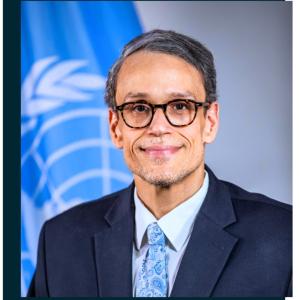Honorable Members of the National Assembly Committees on Gender, Children, Social Welfare; Human Rights and Constitutional Matters and Health, Disaster and Humanitarian Relief.
Honourable Minister of Gender, Children and Social Welfare Mrs Fatou Kinteh;
Honourable Minister of Health, Dr Ahmadou Lamin Sanneh;
OHCHR West Africa Regional Representative, Mr Robert Kotchani;
Chairman, National Human Rights Commission, Mr Emmanuel Daniel Joof;
UN Heads of Agencies and colleagues;
Government and CSO Partners;
Distinguished Ladies and Gentlemen;
Good morning,
I welcome you all to this pivotal training aimed at strengthening the legislative capacity of our esteemed National Assembly Committees.
This gathering represents a significant milestone in our ongoing efforts to uphold human rights including promoting gender equality and safeguarding the welfare of children and vulnerable populations in The Gambia.
The Gambia has embarked on a transitional justice process, underscored by the establishment of key institutions such as the Truth, Reconciliation and Reparations Commission (TRRC) and the National Human Rights Commission (NHRC).
These efforts have been instrumental in shedding light on past injustices and advancing initiatives aimed at fostering a society built on principles of justice, equality, and respect for human rights.
However, amidst these achievements, we must acknowledge the persistent challenges that warrant our steadfast attention and united action.
The threat to the repeal of the anti FGM law highlights the fragility of our established rights.
Addressing issues like gender-based violence, child protection, and legislative reforms must remain top priority in our legislative agenda, necessitating innovative solutions rooted in international human rights norms and standards.
Ladies and gentlemen,
Training national assembly members on key human rights issues including children's rights, gender equality, and health is crucial for developing effective policies and protective laws.
It helps legislators understand the challenges faced by vulnerable groups and enables them to create laws that promote fairness and justice.
It also equips them with the necessary knowledge to oversee the implementation of international conventions and national laws effectively.
Moreover, informed National Assembly members can advocate for budget allocations that prioritize the realisation of the rights of vulnerable groups leading to better outcomes in education, healthcare, and overall quality of life.
This rights-based and holistic approach to policymaking significantly contributes to the achievement of the Sustainable Development Goals, particularly those related to health, well-being, and reducing inequalities.
Ladies and Gentlemen,
Over the next three days, this training will provide a platform for robust discussions, knowledge sharing, and strategic planning.
We are fortunate to have experts from UN agencies, government, NHRC, and civil society organizations leading the sessions.
Their insights will deepen our understanding and help us handle our legislative duties effectively.
Let us seize this opportunity to enhance our capabilities, forge meaningful partnerships, and work towards a fairer and more inclusive society.
I commend OHCHR for leading this effort and thank UNICEF, UNFPA, UN WOMEN, and UNAIDS for their strong collaboration.
I also appreciate the support from the Government, the National Human Rights Commission, and the Civil Society Organizations here today.
As we embark on this journey together, the UN is committed to supporting legislative decisions that safeguard the rights and dignity of all Gambians.
We remain dedicated to continuous partnerships that promote and protect the rights of all rights holders including groups often marginalised and left behind such as women, children, persons with disabilities and people living with HIV/AIDS in The Gambia.
Thank you.














